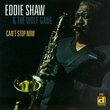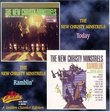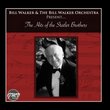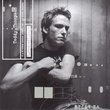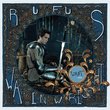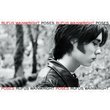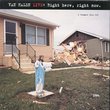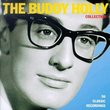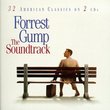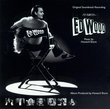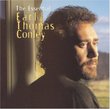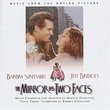| All Artists: Lead Belly Title: Lead Belly's Last Sessions Members Wishing: 5 Total Copies: 0 Label: Smithsonian Folkways Release Date: 9/25/1994 Album Type: Box set Genres: Country, Blues, Folk, Pop Styles: Classic Country, Traditional Blues, Acoustic Blues, Traditional Folk Number of Discs: 4 SwapaCD Credits: 4 UPCs: 093074006825, 093074006849 |
Search - Lead Belly :: Lead Belly's Last Sessions
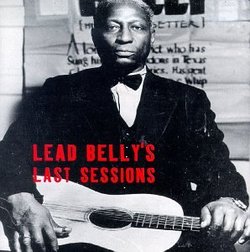 | Lead Belly Lead Belly's Last Sessions Genres: Country, Blues, Folk, Pop
Leadbelly's Last Sessions is a remarkable document. Recorded over the course of three nights in 1948, approximately one year before his death, Sessions constitutes the only commercial recordings of Leadbelly ever made on m... more » |
Larger Image |
CD DetailsSynopsis
Amazon.com essential recording Leadbelly's Last Sessions is a remarkable document. Recorded over the course of three nights in 1948, approximately one year before his death, Sessions constitutes the only commercial recordings of Leadbelly ever made on magnetic tape. The sound here is still primitive by most standards, but it's a vast improvement over the quality of his earlier sides. On this four-disc collection, Huddie Ledbetter sets down as much of his repertoire as he could, from field hollers, blues, and country & western songs to children's tunes, ballads, autobiographical pieces, and popular hits of the day. The tape continues to roll between takes, catching Leadbelly's shifts of moods and changes of interest. He didn't know these would be his last recordings, of course, but he seems to have saved something special for these performances, which are as freewheeling, charming, and authoritative as anything he ever recorded. --Daniel Durchholz Similar CDs
Similarly Requested CDs
|
CD ReviewsA must have but, but not necessarily a definative collection B. Johnson | California, United States | 04/16/2003 (5 out of 5 stars) "These four disks are recorded on analog audio tape. The only ones existing of Leadbelly. (all other leadbelly recordings are straight to vinyl) The recodings were made in the living room of a folk song collector, on two or three seperate nights. Since the first night leadbelly didn't bring his guitar he sings acapella most of the first disk. The other three disks have his 12 string accompanyment. The improved sound quality becomes very apparent here. Unlike most of his records you can hear all 12 strings! It sounds beautiful. Another benefit of these being on audio tape is that Leadbelly can potentially play a song much longer than in prior recording. However he seldom does. Being more informal than a recoding studio it also gives insight as to what Leadbelly's set list may have been like at a concert or everyday party. Though these individual song versions may not be the definative versions, or Leadbelly at his best, all these songs are gems and a must have for any folk collection. Also be warned that due to the informal nature of these recordings, songs are at times cropped in the beginning or end due to the tape running out. Towards the end of the disks Leadbellys wife Martha sings with him. In all due respect to Martha she sort of slows the momentum of this collection down. Though I'm sure Leadbelly always encouraged people to sing along with his songs, and he can be heard doing so here. The brightest gem of this collection may be listening to Leadbelly laugh at his own singing on the funny classic, Diggin' My Potatoes. Or being able to hear him slap his knee in time on Salty Dog. Summary: Sping for it. Its something you won't find on any other collection." The sweetest from the Sweet Singer of the Swamplands H. Brumfield | St. Louis, MO | 01/22/2003 (5 out of 5 stars) "Prior to this record, Huddie Ledbetter was confined to the limitations of the recording technology of the day. This resulted in an abundance of two-to-three minute long gems (as much as would fit on an acetate disc) which, while brilliant, obscured the essence of Leadbelly's artistry as a "songster". Fortunately for us and the evolution of popular music as a whole, shortly before this giant of a man (who survived having his throat cut, being shot at by the chain-gang boss as he escaped with ball-and-chain in hand, a suicide attempt as a last resort from prison, and the finicky tastes of New York high society which regarded him as little more than an amazing novelty) succumbed to Lou Gehrig's Disease, new technology was introduced that allowed him to loosen up and let the music flow naturally. And a motherlode of music it is. While the first CD is comprised of accapella field hollers and spirituals, the other three are filled with some of the most incredible guitar work you'll ever hear, bar none. As Huddie (pronounced Hyoo-dee) himself explains to the listener, he learned guitar "sittin' by the bass-side of the piana" in honky-tonks on Shreveport, Louisiana's Fannin Street. Therefore his aggressive 12-string guitar style is informed by a rollicking boogie-woogie barrelhouse/ragtime feel, that often sounds like several guitarists at once. This is best exemplified in his own ode to Fannin Street, "Cry For Me", and the rag "Easy, Mr. Tom", which has enjoyed many permutations, "Hot Dog" by Blind Lemon Jefferson and "Cannonball Rag" by the Nitty Gritty Dirt Band among them. As Leadbelly comments as the tune ends, "It's so easy when you know how." Leadbelly knew some thousand songs, and this collection is merely the tip of the iceberg. It includes some of his best-known work, "Goodnight Irene", "Grey Goose", "Midnight Special", and his version of "Easy Rider" ("rider" was slang for girlfriend). It also includes his interpretations of the work of Stephen Foster (of "Camptown Races" fame, and the first "pop star"), some of the most beautiful and haunting melodies, "Springtime in the Rockies" and "I'm Alone Because I Love You". "Salty Dog" finds him clapping the beat between guitar strums. He even sings a whole song in pig-latin (after explaining what pig-latin is). Also included is "Sweet Mary", written for Governor Pat Neff, which won him a pardon from prison ("If I had you Gov'na Neff like you got me/ I'd wake up in the mornin' I'd set you free...") Occasionally he pauses to take a drink or serve up an anecdote to set up a song, strumming a chord to tune as he speaks. You feel as though you're in the room with him, watching his roughened hands play across the strings. Sadly, perhaps his greatest known song, popularized by Nirvana, "Where Did You Sleep Last Night" (also called "In the Pines"), is missing from this collection. But apparently Kurt Cobain was introduced to Leadbelly through Last Sessions, and it was one of his favorite albums. Also regrettably missing is "John Hardy", the outlaw ballad rocked up by Uncle Tupelo. Leadbelly is unique among much early blues music, which seems to often be perceived as depressing. Leadbelly's work is uplifting, joyous, funny (and fun), and perfect for inspiring a good mood. There's nothing stale about it-- it's as vibrant as the day it was set to tape. As Leadbelly sings, "Somebody should ask you people who made up this song/ Tell 'em Huddie Ledbetter done been here and gone..."" Essential, but not the best set for casual listening H. Brumfield | 11/11/2000 (5 out of 5 stars) "(4 CDs: 64'/60'/63'/64') I entirely agree that this is indeed essential Lead Belly. However, I would point out to the unwary buyer that these are not commercial studio takes; they were recorded by Frederic Ramsey Jr. in his home, in a room set up as a makeshift studio. Sound is not a problem, but the CDs contain some talk - not only Lead Belly's introductions to the songs, as he frequently gave on his recordings, but there is also some lengthier discussion, including with the other people in the room. In addition, several "songs" are mere fragments. All this is invaluable to any serious folk music fan, but on the other hand it can be quite distracting for casual listening. These are CDs that you will want to play in order to study them..."
|

 Track Listings (34) - Disc #1
Track Listings (34) - Disc #1